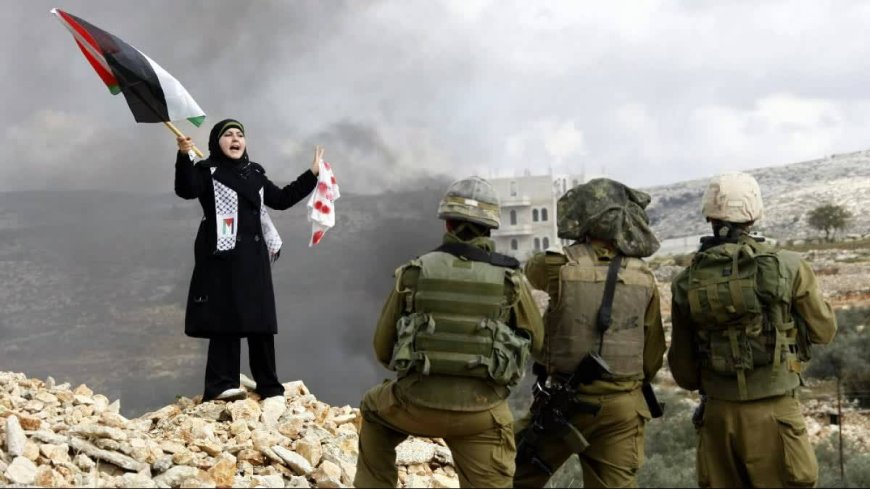Resilient and Defiant: Palestinian Women's Struggle for Freedom and Liberation
The ongoing conflict between Palestine and the Israeli regime stands as a significant source of insecurity in the Middle East and North Africa (MENA) region. It sheds light on the international community's failure to uphold moral standards when engaging with certain nations. This age-old conundrum encompasses the struggles of various nations against despotic regimes, invaders, and occupiers.

While often discussed in military and political circles, it is crucial to acknowledge the gender dimensions of the Palestinian conflict and the unfortunate ramifications it has had on Palestinian women. These consequences include forced displacement to other countries and the hardships endured within the 1948-occupied territories.
To gain a deeper understanding of the systematic violence against Palestinian women by Israeli forces, we can approach the issue from two perspectives. Firstly, we must go beyond reducing violence against women in conflicts to merely gender-based violence. Secondly, there is a significant lack of international support specifically for Palestinian women.
The international community's attention to sexual violence as a war crime gained traction after the shocking events in Rwanda and the former Yugoslavia in the 1990s. This led to the classification of sexual violence in conflicts as a "war crime." However, despite this international progress in addressing the plight of women, three major problems have arisen.
Firstly, by primarily focusing on rape and sexual harassment, international attention has been diverted from other pervasive forms of violence against women during times of war, resulting in the neglect of these issues.
Additionally, the emphasis on establishing a connection between violence against women in unsafe social environments and human rights issues related to quality of life has diminished. Instead, there has been an overemphasis on security concepts favored by Western governments.
Thirdly, the response to violence against women who have endured abuse during wars and conflicts is heavily influenced by the ethnic or religious identity of these women and the perceived impact of the conflict on the security of powerful governments. As a consequence, Palestinian women have not received the support they deserve due to their identity not aligning with the priorities of Western governments.
When specifically focusing on the issue of violence against women in conflicts, it becomes apparent that Palestinian women have been deliberately overlooked by the international community. Numerous instances of torture and rights violations have been inflicted upon Palestinian female prisoners and detainees within Israeli prisons. These transgressions include physical and psychological torture, cruel interrogations involving forced nudity, as well as continuous verbal abuse during questioning. Such actions clearly contravene international laws and standards regarding prisoner treatment.
Palestinian female prisoners have been stripped of their privacy in Israeli prisons, constantly monitored through CCTV cameras in corridors, prison yards, and even restrooms. During the 2014 war between Israel and the Palestinian resistance in Gaza, the failure of the international community to intervene and protect Palestinian women was particularly evident. Like their counterparts in other conflicts, Palestinian women endured immense suffering. They witnessed the destruction of their homes, the loss of their children, and the deep terror experienced by their surviving children. Additionally, many women in Gaza have faced mental health issues. Despite the severity of the crisis, the international community chose not to intervene in this catastrophic situation.
Regrettably, this pattern persists today, as the ongoing war continues to inflict numerous health problems on women and children in Gaza, yet very few human rights organizations have made efforts to protect them.
Nevertheless, Palestinian women have demonstrated remarkable resilience and solidarity with their society during these challenging times of conflict. They have not only strived to alleviate their children's fears but also maintained a narrative of struggle and martyrdom in pursuit of their ultimate ideal: the freedom of Palestine and the liberation of their occupied lands. For them, this resistance represents a form of perpetual victory.
Palestinian women have developed survival strategies that distinguish their definition and narrative of survival and life from others. Figures like Leila Khalid, renowned for her hijacking incident in 1969, and Dalal Mughrabi, who led a heroic Palestinian guerrilla operation, exemplify these empowered women. Furthermore, women living in Baitul-Muqaddas (Jerusalem) serve as protectors of the holy Al-Aqsa Mosque. Throughout history, Palestinian women have crafted their own narratives of resistance as a result of being overlooked by the international community.
Even those women who were not initially involved in military struggles and resistance movements have become active participants during times of war, engaging further in political and public life. In the absence of their husbands and fathers, who are either imprisoned, in exile, or martyred, Palestinian women have taken on the responsibility of defending the refugee camps. They have organized the Palestinian movement on numerous occasions and played a significant role in reconstructing their homes and camps following attacks by the Israeli regime.
Considering this historical evidence, it is clear that Palestinian women have consistently influenced their own destiny. In the recent conflict ignited by Operation Al-Aqsa Storm, the resilient women of Gaza will undoubtedly employ similar survival strategies to rebuild and shape the post-war conditions, thereby contributing to securing a bright future for the next Palestinian generations.
As the international community reflects on its shortcomings in addressing the plight of Palestinian women, it is imperative to reassess moral standards and support these resilient individuals who have persevered against immense adversity. By doing so, we can strive for a more just and inclusive world where the rights and well-being of all women are upheld, regardless of the geopolitical context.













































